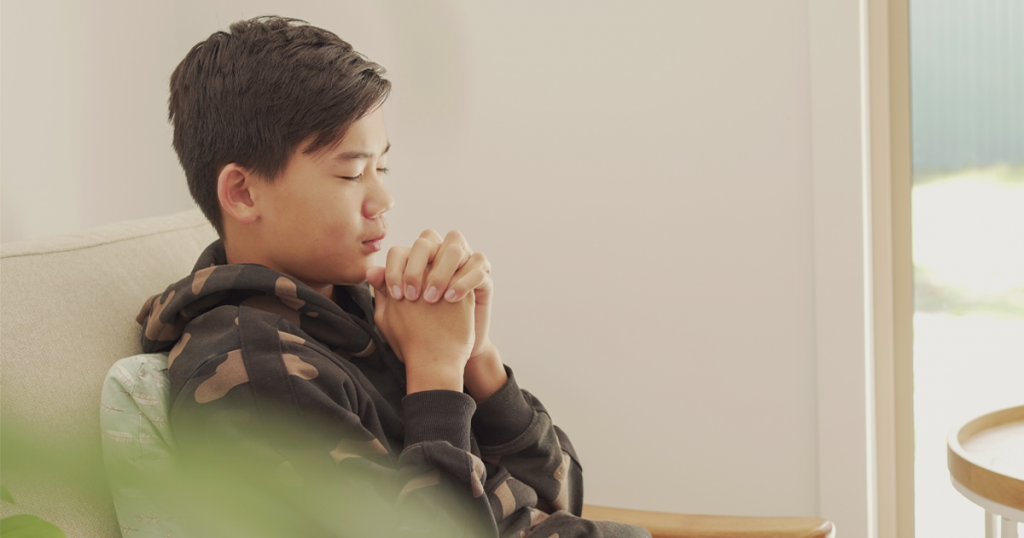Prayer Begins at Home
"George had learned the power of prayer—and so had I."
“George, it’s your turn to ask the blessing,” I reminded our nine-year-old when we had all taken our places at the dinner table.
George’s eyes grew wide with panic. He looked at me pleadingly, shaking his head.
“Go ahead, it’s all right,” I encouraged.
Reluctantly he prayed, stammering and stumbling, self-conscious and unprepared for the assignment. This was not unusual, and I excused him, thinking—he’s just a little boy. He would learn as he grew older.
It wasn’t until I passed him the meatloaf that I saw the tears of embarrassment and shame he tried to hide as he turned his face away. Suddenly, I realized I was not making excuses for George; I was making them for myself. I had been too busy to teach him how to pray—too busy even for bedtime prayers, something our two older children had taken for granted. I knew it was time to provide George with the training he needed to be comfortable praying.
At bedtime, George responded happily to the idea of praying together each night. He suggested I pray first, and I was thankful for the opportunity to set an example for him. I had scarcely uttered, “Dear Lord,” when he halted me mid-word. He reached out and grasped my hand in the thumb-locked position. I continued with my prayer, and he followed. He was not much better that time, but improvement was to come quickly.
I feared the prayers would become a ritual, his parroting mine, so I tried to include a variety of topics in my nightly examples. One evening when I was tired and anxious to get him stowed away for the night, I recited my prayer without variations and quickly closed so he would get on with his prayer.
My thoughts wandered as he began, but his words forced me back to attention. He was not repeating my “canned” prayer. He prayed for a neighbor boy whose leg had been broken in a bicycle accident, for Susie whose cat had run away, for his older brother to return safely from a weekend trip. Then he thanked God for helping him do his best at soccer practice. These were important and serious in his world. At that moment I had difficulty remembering who was doing the teaching here.
The next time George came down with a cold, I applied all the usual cold remedies, gave him a loving squeeze, and turned to leave him in his misery. “Mom,” he called after me, “will you pray for my cold to get better?”
Why hadn’t I thought of that? I prayed, knowing God would honor his faith.
A few weeks later, George accidentally scratched the surface of his eye and had to go to the doctor. After treating the wound, the doctor covered his eye with an eye patch and told us it would take three or four days to heal. He warned us to watch it closely.
That night at bedtime, his dad prayed for the healing of George’s eye and the discomfort he was feeling. During the middle of the night, we were awakened by George calling from the hallway outside our bedroom door, “My eye is better, Dad!” That was all. He turned and stumbled back to bed. The next morning, we removed the patch to find that the scratch, clearly visible the day before, had disappeared. A trip to the doctor verified that it was completely healed, and we returned home scarcely believing what had happened. But George had no trouble believing. “I told you it was better. Remember—Dad prayed for me.” Prayer and faith were all that were needed, and George had supplied enough for us all.
Our biggest battle was yet to come. We had tried to help George overcome a fear of darkness that had plagued him from an early age, but every effort had failed. It was after one of my long tirades on the topic that he decided prayer was the logical answer to this need, too. George and I prayed about it for some time. He asked that it be our secret, and it remained so until the Lord gave him a clear victory.
These are but a few of the lessons I recalled last evening when it was George’s turn to ask another dinner blessing; he responded eagerly. I blinked back tears of joy and gratefulness as I listened to him talking to the Lord as to a dear friend. George had learned the power of prayer—and so had I.
1 CORINTHIANS THIRTEEN for PARENTS
A parent is patient,
A parent is kind,
A parent does not envy
And is not proud.
A parent is not rude or self seeking.
A parent is not easily angered
And keeps no record of wrongs.
A parent does not delight in evil
But rejoices with the truth of God’s love.
A parent always protects,
Always trusts,
Always hopes.
A parent never gives up.
This article was originally published in the October 2019 issue of The War Cry.







